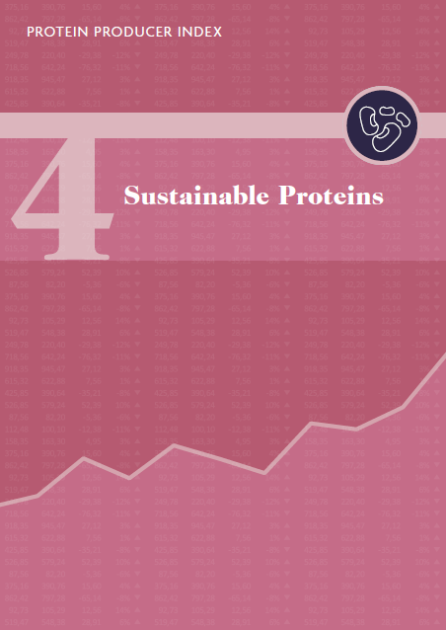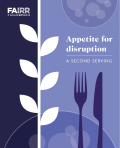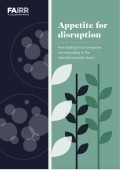Introduction
The 60 global companies included in the Index are some of the world’s largest producers and sellers of meat, fish and dairy. Their growth ambitions remain predicated on increasing global consumption of animal proteins, especially in emerging markets. Yet, the most advanced scientific consensus – including from the IPCC – is that even current levels of animal protein consumption pose a profound threat to human and planetary health. This threat is compounded by the sector’s vulnerability to climate change impacts.
For companies in the livestock and fish sectors, diversifying product portfolios to include both animal and alternative protein sources presents the biggest opportunity to bolster market shares and mitigate operational risks while building agility to respond to market and technological disruptions. The Coller FAIRR Protein Producer Index has tracked the exposure to and investments in alternative proteins from listed animal protein producers over the last four years. We score companies according to their performance on this theme (the Opportunity Factor score), and the final Index score over-weights the Opportunity Factor Score over the Risk Factor Score since that exposure to alternative non-animal proteins mitigates risk exposure across key themes.
In 2021, almost half (28) of Index companies have exposure to alternative proteins, up from 22 companies in 2020 and just 15 companies in 2019. Companies have significantly increased their activities with more product launches, dedicated plant-based brands and investments. This year’s Index has seen an increase in the number of companies with dedicated plant-based brands, rising from 11 to 17 in one year. This number includes the two beef giants: JBS, with the launch of its plant-based brand, Planterra Foods, and Marfrig, with the launch of Plant Plus Foods in partnership with ADM. In Asia, Thai-based agri-food conglomerates, Charoen Pokphand Foods (CPF) and Thai Union, launched MEAT ZERO and OMG Meat, respectively, while Taiwanese-based DaChan Great Wall Enterprise launched NEOPLANT, a plant-based meat brand.
Investing in Alternative Protein
The listed animal protein sector is accelerating investments to build internal capabilities in the plant-based space. JBS, Tyson Foods and Maple Leaf have reported investments in the millions allocated to expanding R&D and production capacities (though only Maple Leaf formally allocates capital investments to its plant protein group). Internal teams at Sweden’s Scandi Standard, Taiwan’s Great Wall Enterprise and Thailand’s CPF and Thai Union have built or are building their own plant-based products.
Companies are dabbling in technology platforms like fermentation and cultured meat through external investments and/or partnerships; disclosed investments remain at less than $115 million. Seven meat companies have reported investments in cultured meat; most recently, JBS announced a $100-million investment in cultured meat. Other prominent announcements came from Aleph Farms, the Israeli start-up working on cultured beef, which has signed a Memorandum of Understandings (MoUs) with BRF and Thai Union to support scaling, go-to-market strategies and distribution, in addition to participation in the start-up’s latest fundraising round. Thai Union signed a similar agreement with cultured seafood start-up, BlueNalu Inc., in early 2021. The only company that has referenced internal resources dedicated to cultured technology is NH Foods, one of Japan’s largest meat companies, which reported that internal teams were looking at how to cultivate cells more efficiently.
The focus on fermentation has heightened this past year – both Hormel Foods and JBS have announced partnerships in this space, the former with a start-up that uses potato-based fermentation and JBS with Mycotechnology, a manufacturer of fermented ingredients. We are seeing similar momentum among retailers and manufacturers driven by their collaborations with start-ups and academia around fermented protein, including Kerry Group, Unilever, ICA Gruppen and Marks & Spencer (see FAIRR’s Sustainable Protein Hub). Recently, even the Danish biotech company, Novozymes, announced a new strategic direction focused on advanced protein solutions for the food and beverage industry, leveraging its expertise in enzyme fermentation. It has committed over $300 million to build a new production facility in Nebraska, US.
The technology is especially promising because the protein that is produced via fermentation can be used as either an end product or a specific ingredient to improve the taste and texture of alternative proteins. The wide use of fermentation in food and pharmaceuticals also presents lower scale hurdles related to the development of infrastructure and know-how relative to cultivated meat.







